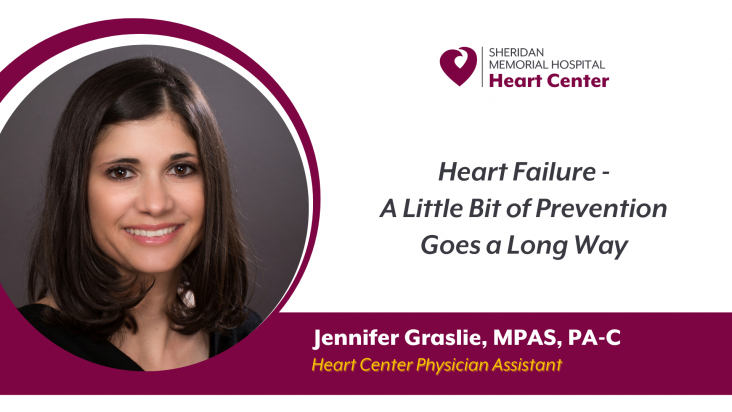As we approach World Heart Day, September 29, a day created to spread awareness about cardiovascular disease, we find it fitting to address ways to combat it. Here at Sheridan Memorial Hospital, we diagnose and treat many forms of heart disease. This article addresses Heart Failure, what it is, risk factors, diagnosis and self-care.
Heart failure is a very common disease affecting 6.2 million Americans (CDC September 8, 2020). It is more prevalent than all forms of cancer combined. Heart failure occurs when fluid accumulates in the body because the heart cannot pump efficiently. High blood pressure, diabetes, coronary artery disease and age can all contribute to causing this illness. Symptoms of heart failure can include fatigue, shortness of breath and swelling. As our population becomes older and more sedentary, we expect heart failure to become more widespread.
Prevention is the most effective measure for counteracting the risk factors that can lead to developing heart failure. There is ample medical evidence proving that a person can lower or prevent such risk factors as high blood pressure, diabetes, and coronary artery disease. It requires maintaining a healthy weight and diet and modifying certain lifestyle habits. If a person already has one or more risk factors, tight control of blood pressure or blood sugar and coronary artery disease can help prevent or delay the onset of heart failure. Even modest weight loss and increased cardio-respiratory fitness can significantly improve heart health.
There is some good news for those patients with a diagnosis of heart failure. Several medications produce wonderful results, including certain beta-blockers, ACE inhibitors, angiotensin receptor blockers, aldosterone antagonists, and Entresto. Patients with heart failure are experiencing fewer symptoms and some are living longer. Other patients are benefiting from special pacemakers that synchronize the heart, allowing it to beat more efficiently. These special pacemakers can further reduce patient symptoms and improve survival.
When heart failure progresses to an advanced stage or warrants hospitalization, it becomes an identifying marker for patients who will require more intensive follow-up care for the rest of their life. As a cardiology office, we routinely see patients with a heart failure diagnosis. Our focus is on providing up-to-date medical management for heart failure. The program involves providing in-depth patient education and having patients monitor their weight, blood pressure and sodium intake daily. Patients must also watch for and report these early warning signs: feet and ankles swelling more than usual, breathing that becomes more difficult, or a weight gain of 3 pounds in two days. These signs might indicate that fluid is building up in the body. Early intervention ensures ongoing symptom management and overall well-being.
With heart failure becoming more widespread over the next few decades, our understanding of preventing and treating this disease will also continuously improve.
To learn more about Cardiology at Sheridan Memorial Hospital, plan to attend our Doc Talk at The Hub on Smith on Thursday, September 22, from 11:30 am to 12:30 pm. We will have representatives from our Heart Center and our Cardiac Catheterization Lab on hand to show you devices, including stents, implantable pacemakers, and defibrillators. They will explain when and how they are used, what they do, and how they can save a life. Bring your questions to this free public event. The Hub is located at 211 Smith Street.


